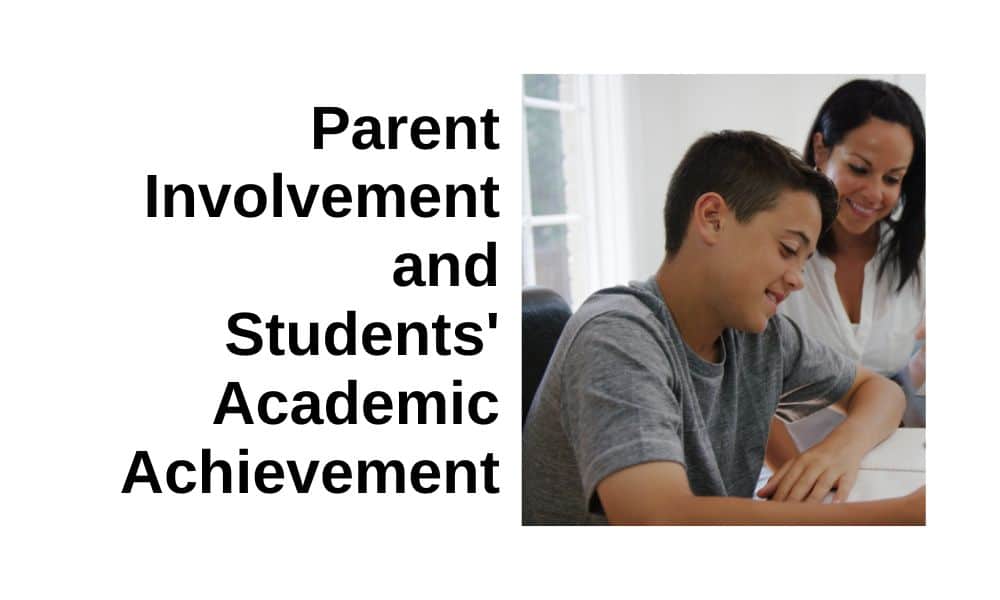
Parents, teachers, and researchers alike are interested in promoting children’s academic competence. Academic achievement has been linked to many factors. This article discusses the role of parental involvement in students’ academic achievement.
Education starts at home
Teachers, administrators, and policymakers have recognized the impact of parental involvement on student academic achievement. They consider parental involvement to be an integral part of new educational reforms and initiatives.
While socializing and educating children is a shared obligation between parents and schools, education begins at home. Parents must participate in the educational process for a child to reach academic achievement.
Parents’ engagement in their children’s schooling can profoundly affect their children’s success (Tran et al., 2020). Studies demonstrate that students do better academically, attend school more regularly, and score higher on standardized tests when their parents are also invested in their education (Utami, 2022).
Parents can support their children’s learning in various ways, including assisting with homework, attending school events, being active in school decision-making, and maintaining open lines of communication with instructors (Cusinato et al., 2020).
Education more important than money
A field-based study by Barbara Schneider and Yongsook Lee (1990) compared the academic performance of East-Asian American school students and European-American students. Students in special classes who had learning disabilities or physical handicaps were excluded from both groups. The two groups were compared with regard to their ability in the Latin alphabet.
Data collected indicated that East-Asian academic performance on achievement tests and report card grades was higher than that of the European-American students in all areas except language skills. Differences in language performance could be attributed to the fact that many East-Asian students were at a disadvantage because their parents did not speak English.
Schneider and Lee found only cultural differences — all related to parental involvement — to explain East-Asian Americans being superior to the European-Americans. For example, 22 out of 37 East-Asian parents reported they had spent time teaching their children reading, writing, and simple arithmetic skills before entering kindergarten. Only 4 of 25 European-American parents indicated they had engaged in similar activities. East-Asian parents closely monitored and controlled their children’s use of time on academic and social pursuits, and they placed a high value on education.
“There is nothing without education,” one parent remarked. “Education is more important than money.”
Parental expectation the strongest
Fan and Chen (2001) performed a meta-analysis to synthesize the quantitative literature about the relationship between parental involvement and students’ academic achievement.
The findings revealed a small to moderate — and practically meaningful — relationship between parental involvement and academic achievement. Moderator analysis revealed that parental aspiration/expectation for children’s educational achievement has the strongest relationship, whereas parental home supervision has the weakest relationship with students’ academic achievement.
It impacts elementary and secondary school
A meta-analysis by Jeynes (2005) of 41 studies examined the relationship between parental involvement and the academic achievement of urban elementary school children. Results indicate a significant relationship between parental involvement overall and academic achievement. Parental involvement, as a whole, was associated with all the academic variables by about 0.7 to 0.75 of a standard deviation unit. This relationship held up for European-American and minority children and also for boys and girls.
Jeynes (2007) also undertook a meta-analysis of 52 studies to determine the influence of parental involvement on the educational outcomes of urban secondary school children. The results indicate that parental involvement also significantly influences secondary school children. Parental involvement, as a whole, affects all the academic variables under study by about 0.5 to 0.55 of a standard deviation unit.
Impact of homework assistance weak
A study by Wilder (2014) synthesized the results of nine meta-analyses that examined the effects of parental involvement. The results indicated that the relationship between parental involvement and academic achievement was positive, regardless of the definition of parental involvement or measure of achievement.
Furthermore, the findings revealed that this relationship was strongest if parental involvement was defined as parental expectations for their children’s academic achievement. However, the impact of parental involvement on student academic achievement was weakest if parental involvement was defined as homework assistance.
Finally, the relationship between parental involvement and academic achievement was found to be consistent across different grade levels and ethnic groups. However, the strength of that relationship varied based on the type of assessment used to measure student achievement.
Edublox offers cognitive training and live online tutoring to students with dyslexia, dysgraphia, dyscalculia, and other learning disabilities. Our students are in the United States, Canada, Australia, and elsewhere. Book a free consultation to discuss your child’s learning needs.
References:
Cusinato, M., et al. (2020). Stress, resilience, and well-being in Italian children and their parents during the COVID-19 pandemic. International Journal of Environmental Research and Public Health, 17(22).
Fan, X., & Chen, M. (2001). Parental involvement and students’ academic achievement: A meta-analysis. Educational Psychology Review, 13(1): 1–22.
Jeynes, W. H. (2005). A meta-analysis of the relation of parental involvement to urban elementary school student academic achievement. Urban Education, 40(3): 237-69.
Jeynes, W. H. (2007). The relationship between parental involvement and urban secondary school student academic achievement: A meta-analysis. Urban Education, 42(1): 82-110.
Schneider, B., & Lee, Y. (1990). A model for academic success: The school and home environment of East Asian students. Anthropology & Education Quarterly, 21: 358-77..
Tran, T., et al. (2020). Toward sustainable learning during school suspension: Socioeconomic, occupational aspirations, and learning behavior of vietnamese students during COVID-19. Sustainability, 12(10).
Utami, A. Y. (2022). The role of parental involvement in student academic outcomes. Journal of Education Review Provision, 2(1).
Wilder, S. (2014). Effects of parental involvement on academic achievement: A meta-synthesis. Educational Review 66(3).

